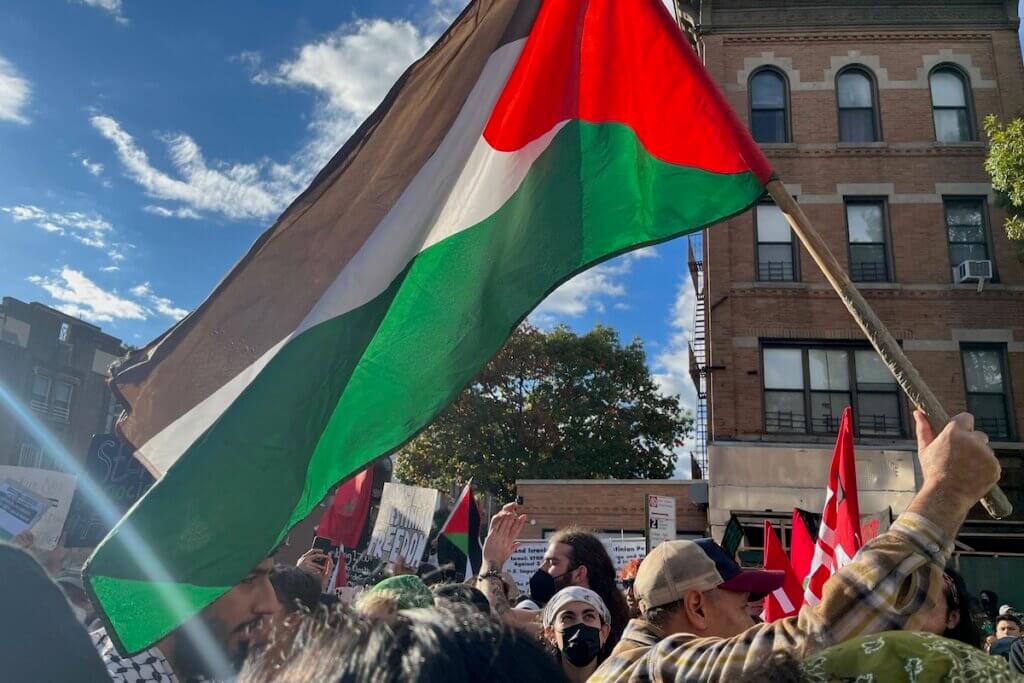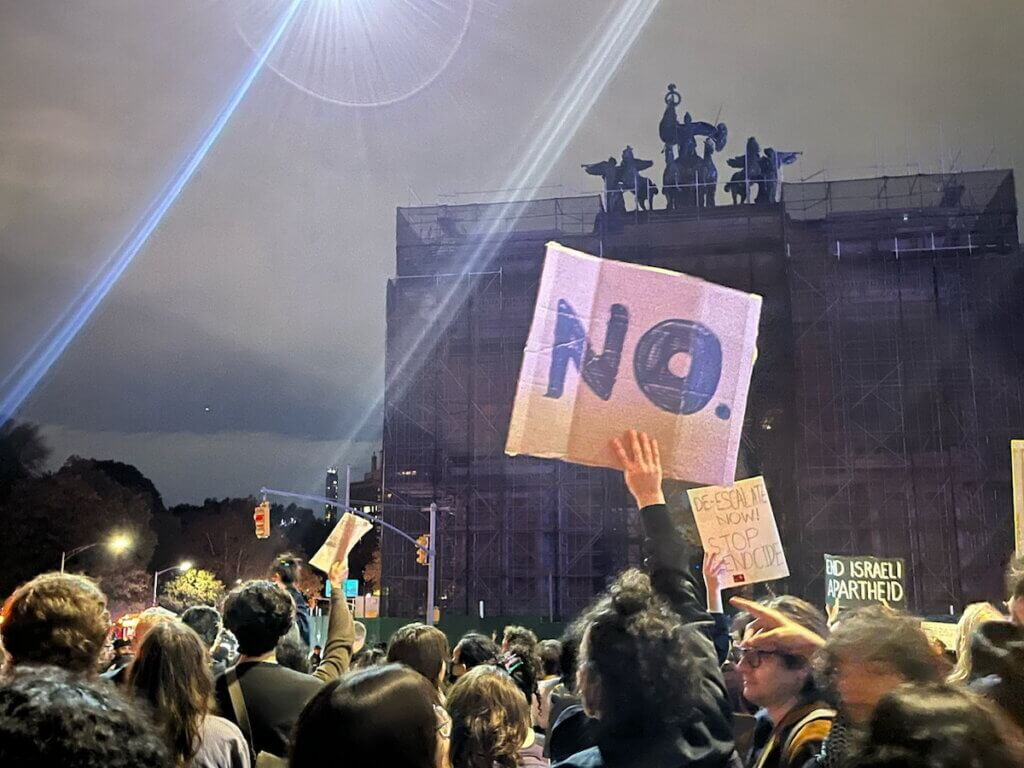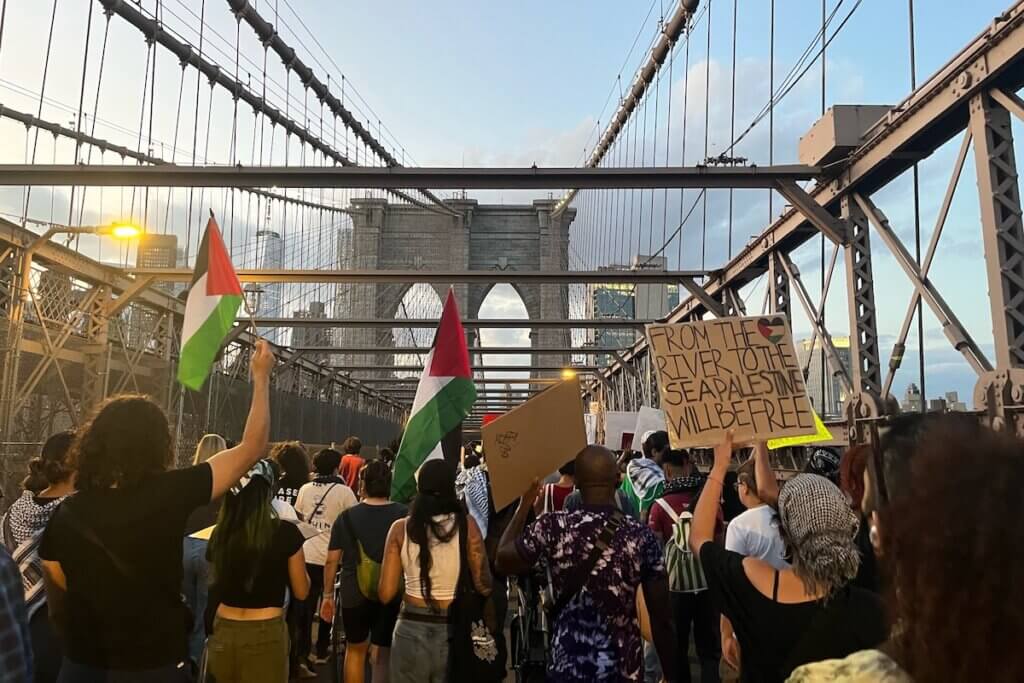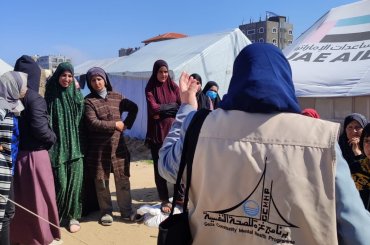It began on Saturday.
October 7. The radio reported bombings in Israel, and I was so afraid for your mother. She lives in Gaza. She taught me how to roll grape leaves. My unpracticed fingers made them too big, while hers were small and perfect. We rolled so many our fingernails were black for days.
I checked on you, worried, but found you radiant. They broke out! You showed me videos and translated from Palestinians around the world. Paragliders – It’s like science fiction! I can’t believe it’s real. A checkpoint where you were repeatedly strip-searched: empty. The bulldozer breaking through the wall, rejoining Gaza with the rest of Palestine. Men stepping outside of their 140-square-mile prison for the first time in their lives, onto the land of their ancestors.
You talked about how you don’t agree with Hamas. You hate war, armies, killing, civilian deaths. It is not an abstract condemnation.
And.
Seeing the fighters retake parts of Palestine opened something. A possibility of being free. You said that for the first time, you had a vision of a life in which you were not always fighting for liberation. What else you could do. How it would feel in your body.
It began in 1948.
Your grandparents fled from Jaffa. Militias and settlers of the new Zionist state drove 700,000 Palestinians from their homes and lands. Displaced by fear, threats, massacres. Over 500 villages destroyed, 15,000 people killed. Women, children, grandparents. Those that escaped left olive trees and vineyards their great-grandparents planted and the graveyards in which they were buried.
Settlers looted silverware, carpets, furniture, and claimed the houses as their own. They poisoned wells to prevent return. (Later they used laws instead.) The planners of the new state called it “cleansing” even at the time. Today one can watch videos online of the old men who were the young soldiers. They laugh as they remember. One of them does not know how many he killed. He had 250 bullets and he used them all. Your mother was born in Rafah five years later, already a refugee.
Your geography includes “the ’48,” “the 1967 line,” the move to Gaza after the Oslo Accords. What I vaguely knew as history were the borders that shaped your family. Damascus, Beirut, Cairo, Dubai, Chicago, Berlin, New York. Looking for home.
It began 14 months ago.
I had a room available. I had Covid. We met on FaceTime, me on my couch, you in a café. You told me again you are Palestinian, as you had written in your email. I realized you needed to know if my house would be safe for you. I did my best to reassure you I am anti-Zionist, dubbed “an honorary Jew” by friends, not a friend to Israel. We talked about schedules, cleaning, my cats. I invited you to move in.
It began in 2007.
Your mother ran for office, but Hamas swept the Gaza elections. Israel tightened its blockade. Food and fuel slashed for 2.2 million people, half of them children. Your cousins, schoolmates, neighbors. A diplomatic cable later revealed the intent: “keep the Gazan economy on the brink of collapse without quite pushing it over the edge.”
Outside the wall, settlements expanded, in violation of international law. The army uprooted ancient stands of olive trees. Settlers poured cement in wells to prevent return. (The state already controlled all the water to Gaza.)
It began the next day.
October 8. Retribution was swift. I learned that the world had seen a massacre, not resistance. I found that my country was supporting the occupier, pledging unlimited support and weapons. As if Gaza was a country. As if it had an arsenal. As if it wasn’t an open-air prison.
Many soldiers had been killed. And too many civilians, brutally. The state uses their families’ pain, spreads other manufactured horrors. Quietly retracts the lies; the damage and dehumanizing done. It is hard to know what to believe.
I believe survivors’ stories and cannot imagine their fear. I notice they all talk about safe rooms. I believe the journalists I start to follow who are reporting from Gaza. There are no safe rooms there. There are no safe places. The number of dead rises staggeringly. Too many civilians, brutally. Families. Babies. Grandmothers. Residential neighborhoods gone, apartment blocks pulverized. Hospitals full of orphans and evacuees. You have told me about your adolescence there. About being the only girl in your class unveiled. About rediscovering the streets with Doa’a on your first trip back in nine years.
Your mother had invited me to visit. I wanted to see the four-decade-old candle she carried from Syria and be a guest in her kitchen. There are no safe places now.

It began in 1917. The occupying British determined Palestine was a good place for a new Jewish state. It was in the interest of the west to have an ally in the region.
It began in 2018. Peaceful Palestinian demonstrations for the right to return were met by tear gas and bullets. Soldiers killed 200 protesters and injured tens of thousands more.
It began in 1967. Israel occupied more land, taking Gaza, the West Bank, and Syria’s Golan Heights. Ten Palestinian villages were razed.
It began
and began
and began

It begins every morning now.
You wait for her text when morning comes to Gaza. It is all we think about. The bombs. My fear is so small compared to yours. I have never waited for proof of life before. Every day. Twice a day. For the blue checks on WhatsApp, for the news of making it through another night. “Mama is still alive,” you tell me.
I think of the awkward, persistent, laughing attempts at conversation she and I had in our kitchen in June, working with gestures and her English fragments. (broken, but more robust than my few Arabic phrases. Sabeh al kheer, shukran. Good morning, thank you.) She told me about her at-home hair coloring routine and the women whose lives she has saved.
We go to be with your friends in grief and music to pass another night. There is a birthday. “To a free Palestine!“ is the wish. On the phone with your friend in Berlin, you tell her, laughing (because what else is there to do?), “It’s Siena‘s first war.” I hear my name so often in your Arabic conversations with friends, your steady stream of visitors thanks me for my support. As if I could do otherwise. As if I could look away. As if I would want to. Your mother is hiding from bombs made here and funded by my government. My care for you has become a political act.
How many wars have you lived through? How would you even count? You have explained your documents; the bureaucracy you navigate as collateral of occupation. A passport from a country where you never lived, identity card of a stateless nation. Prohibited items at the checkpoint include metal, electronics, creams. Tweezers, phone charger, lipstick. Humanity. Your mother’s visit this spring was delayed by four days of Israeli bombing. You did not buy her plane ticket until she had passed through the Rafah gate and taken the ten-hour taxi ride through desert to Cairo.
You last visited Gaza two and a half years ago and had to leave suddenly when border tensions increased. You lost Doa’a three weeks later. Your cousin was like a sister. Israeli bombs killed her and her family as they held each other on their couch. Only ten-year-old Aziz survived.
You tell me some Palestinian friends wish they were in Gaza now to be with their families, no matter what happens. You tell me that the way you were always expected to take care of your mother was by leaving. By keeping yourself far away and safe. So you would survive if no one else did.
I cannot focus. I am irritable. I am so tired all the time. I am tired from the worry and fear and uncertainty and fury and gaslighting, and from trying to witness and hold from afar some small part of the horrors. I am tired and I am safe, with a shower every day and too much food. How does a body hold this exhaustion when under constant fire and when food and water have become luxuries? When the occupier is bombing bakeries and hospitals? How does your body hold the exhaustion when your mother is under attack? I think of her long impassioned monologues and her quick smile. Her deep voice. Her opinions on our housekeeping and her stories of outsmarting powerful men. I think of 2.2 million others. The children and mamas and doctors and journalists and artists and the man on her street with the generator that is still, somehow, miraculously, providing her electricity. First war or a lifetime, it is too much to bear.

It will end—
Will it end? How will it end? We march, I call the White House and my Zionist senator. I consider arrest at the second protest but do not want you to worry. I write letters about the propaganda passing as journalism, leave dozens of voicemails, ask everyone I know to do the same. Tens of thousands of Jewish friends and allies march, furious at genocide committed in their name. Never again means never again. The solidarity brings me to tears.
The marches grow. The ceasefire is urgent and is the bare minimum. Let the humanitarian aid through. Turn the electricity and water back on. Better yet, return control of utilities to Gaza. Exchange hostages and prisoners. Lift the siege. Not just this one, the 16-year one. The 75-year one. Stop deputizing settlers. Pull back the settlements. Grant equal rights and guarantee the right of return. End the occupation. From the river to the sea.
When?
(This piece was written with the blessing and support of the person to whom it is addressed.)



“ Grant equal rights and guarantee the right of return. End the occupation. From the river to the sea.”
______________________________________________________________________
Straightforward articulation of a desirable future. One I think is achievable by way of law, likely not by force.